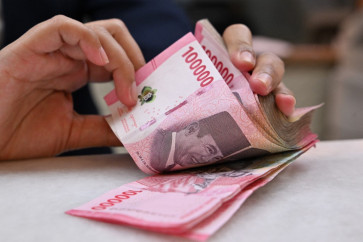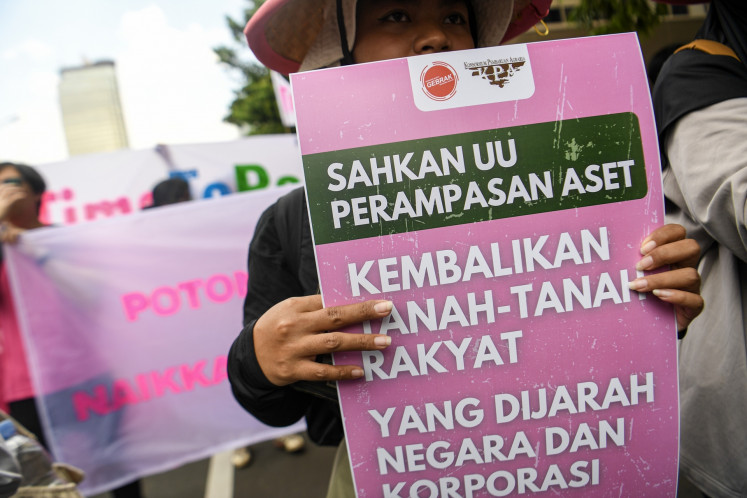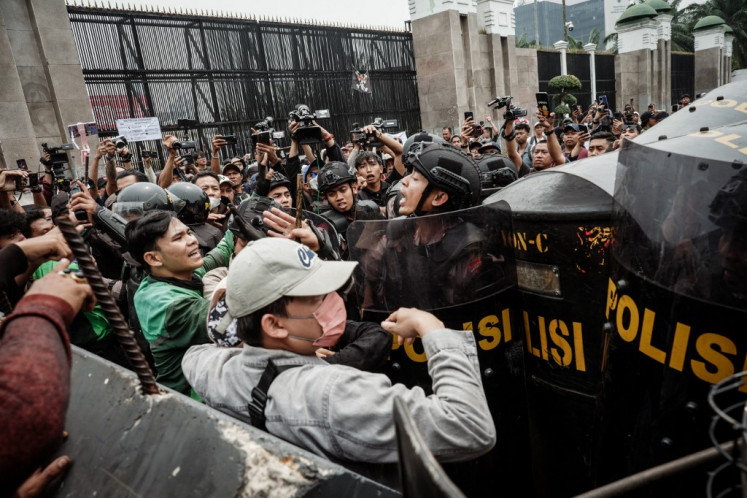Popular Reads
Top Results
Can't find what you're looking for?
View all search resultsPopular Reads
Top Results
Can't find what you're looking for?
View all search resultsA sense of déjà vu: Trade unionism at risk in Indonesia
Unlike in previous years, this yearâs Labor Day saw workers and unionists celebrate International Labor Day at home or at recreational sites
Change text size
Gift Premium Articles
to Anyone
U
nlike in previous years, this year's Labor Day saw workers and unionists celebrate International Labor Day at home or at recreational sites. Only a few of them took to the street to express their grievances.
Not only was the Labor Day commemoration quiet, but there were no specific issues brought to the national tripartite meeting either, despite the many unresolved industrial conflicts that have affected millions of workers in the formal sector.
Even worse, unionists and major confederations who used to be outspoken were not seen at the labor rallies held in early July to protest the contentious government regulation on the withdrawal of pension funds (JHT) managed by the Workers Social Security Agency (BPJS TK).
Speculation has been rife that this rare phenomenon has something to do with a previous meeting between President Joko 'Jokowi' Widodo and 15 unionists at the Tripartite Cooperation Institute (LKS Tripartite), as well as the appointment of several labor activists as commissioners of state-owned enterprises and social security providers.
The government's decision to declare Labor Day a national holiday as in many other countries and to allocate commissioner posts to outspoken unionists was apparently effective in taming hard-line unions such as the Confederation of Indonesian Workers Unions (KSPI) and the Indonesian Prosperity Trade Union (KSBSI).
Such speculation, if proven, will not only discredit unionism in the country but also downgrade the bargaining power of workers when dealing with the government and employers. The involvement of labor activists in practical politics by joining the campaigning team of certain candidates in presidential and local elections will cost unionists their leverage in the negotiation of wage, outsourcing and other disputes with employers and the government.
Leadership crises and union involvement in practical politics has evoked confusion, if not demoralization, among the grass roots. Out of the approximately 40 million workers in the formal sector, only 1.6 million of them belong to the 6,800 company-level unions. Only a few of them have joined the six confederations and 100 federations registered with the Manpower Ministry.
Fragmentation is apparent, particularly within the KSBSI and KSPI, further inhibiting their struggle to represent the demands of workers.
This disunity is inconsistent with global trends, such as the existence of a single international trade union in Europe, two big confederations in the United States and fewer labor unions in other developed countries such as Australia, Japan and South Korea.
Many have perceived the labor movement as betraying Reformasi, which envisioned democracy, freedom of expression, freedom of speech and universal human rights.
The government ratified International Labor Organization (ILO) Convention No. 98 on freedom to unionize through Law No. 21/2000 on labor unions, but most workers have been reluctant to join and unionists are rarely vocal for fears of bearing of the brunt of discrimination in the workplace and dismissals. The recent dismissal of two middle-level workers of Jakarta International Container Terminal (JICT) for protesting the container terminal's concession to a Hong Kong-based company is just one example of union busting.
Despite the reform movement 17 years ago, unionism has remained weak, although in the 2000s a number of hard-line union leaders were involved in anti-government rallies and national bipartite and tripartite dialogues.
The state of labor unions today resembles that under the New Order, when the All-Indonesia Workers Union (SPSI), the only government-sanctioned union, was effectively controlled by the government. Underground unions endured repression and workers had no say in the labor-policy-making process.
The current fragmentation of labor unions and the low level of unionizing should end for the sake of the welfare of Indonesian workers.
Union leaders should adopt a bottom-up approach in recruiting and training unionists at the company level to regain workers' confidence in unions, their platforms and work programs. Skilled and young unionists who emerge from the shop floor are normally responsive to industrial issues in their own workplace, which constitute valuable human capital when they lead labor unions.
Cooperation and affiliation with international trade unions, especially those in industrialized countries, will help Indonesian labor unions design training programs intended to develop negotiating skills and labor knowledge among new union cadres.
The absence of a major confederation and the presence of many federations and company-level labor unions should not be seen as a major hindrance in representing workers provided they build good channels of communication and share common ground on industrial relations issues. Doing so will strengthen their bargaining power and the level of coordination among unions.
In fighting for their political aspirations, labor unions should have specific liaison officers who will negotiate with political parties, presidential and legislative candidates and prospective regional heads. Labor unions and workers should throw their weight behind candidates who are committed to the improvement of the social welfare of workers.
Union leaders should also intensify their push for the House of Representatives, the Regional Representative Council and the President to issue government regulations and presidential regulations that will implement the 2000 labor union law. The legislation encourages all workers, especially 40 million workers in the formal sector, to unionize.
Workers have been waiting too long for the regulations, which are expected to encourage employers to facilitate their workers to unionize. Union busting in many forms is still found in many companies.
Many underpaid workers have been reluctant to question the remuneration system and register with the Health Care and Social Security Agency (BPJS Kesehatan) and the BPJS TK for fear of being dismissed. Many have been fired or discriminated in their workplaces for being outspoken.
________________________
The author is a staff writer at The Jakarta Post.










